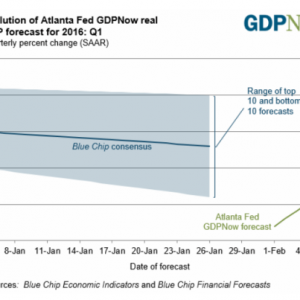Latest Posts
-
Finance 0
Three Reasons Why Facebook Is A Great Momentum Stock
Many investors like to look for momentum in stocks, but this can be very tough to define. There is great debate regarding which metrics are the best to focus on in this regard, and which are not really quality indicators of future performance. Fortunately, with our new style score system we have identified the key statistics to pay close attention to and thus which stocks might be the best for momentum investors in the near term. This method discovered several great candidates for momentum-oriented investors, but today let’s focus in on Facebook, Inc. (FB – Analyst Report) as this stock is looking especially impressive right now...On February 6, 2016 / By Kurt Osterberg -
Finance 0
Is This How The Smart Money Is Betting On A Market Crash?
Instead of allocating capital to expensive tail risk bets on direct asset class collapse (in equities, credit, and commodities), it appears, just as we detailed previously, the ‘smartest money in the room’ is “betting” indirectly on a stock market crash through eurodollar options. just as we detailed previously the costs of tail risk protection in credit and equity markets are soaring (and perhaps the crash in global financial stocks and spike in systemic credit risk supports that concerning possibility). And so traders are looking for cheaper alternatives to place large bets on significant downside in over-inf...On February 6, 2016 / By Kurt Osterberg -
Finance 0
Deutsche Bank Is Shaking To Its Foundations – Is A New Banking Crisis Around The Corner?
The earnings season has started, and several major banks in the Eurozone have already reported on how they performed in the fourth quarter of 2015, and the entire financial year. Most results were quite boring, but unfortunately Deutsche Bank (DB) once again had some bad news. Just one week before it wanted to release its financial results, it already issued a profit warning to the markets, and the company’s market capitalization has lost in excess of 5B EUR since the profit warning, on top of seeing an additional 18B EUR evaporate since last summer. Deutsche Bank is now trading at less than 50% of the share price it was trading at in July ...On February 6, 2016 / By Kurt Osterberg -
Finance 0
How To Generate A 10 Percent Yield From Walmart Stock
Walmart is an excellent candidate for an income strategy. It’s undervalued, a dividend aristocrat and performs exceptionally well in recessions. The strategy involves the sale of a covered call right before earnings are announced. This enables the investor to take advantage of inflated implied volatility which makes call prices more expensive than normal levels. Why Walmart (NYSE:WMT)? We live in a world where yield is king. Central banks around the world have kept interest rates artificially low which have crippled retirees and savers alike. Japan has become the latest victim in the world-wide interest rate debacle announcing the ...On February 6, 2016 / By Kurt Osterberg -
Finance 0
Japan Joins Europe In Taking Rates Below Zero
Japan may be the Land of the Rising Sun… but in terms of monetary policy, it’s the land of falling interest rates. Negative interest rates, to be precise. As damning economic indictments go, it doesn’t get much more doom and gloom than what the Bank of Japan did recently. It lowered interest rates on additional deposits made by banks to negative 0.1%. In doing so, it joined the European Central Bank (ECB) and the central banks in Switzerland, Sweden, and Denmark in pushing their rates below zero. The question is: Why? And what does it mean for the rest of the world and investors? Japan Hits the Nuclear Button Japan’s version of quan...On February 6, 2016 / By Kurt Osterberg -
Finance 0
7 Potential High Dividend Growth REITs To Watch
For income-focused investors, real estate investment trusts (REITs) offer the attractive combination of moderate to high yields and the potential for substantial dividend growth. New REITs hit the market through IPO’s or spin-offs and typically come with an exciting story and not much of a track record. With my focus on the safety of dividend payments and visibility of future dividend growth, I like to let new REITs get seasoned in the market before I make an investment decision. My REIT database includes seven REITs that launched with IPO’s and are now approximately one-year-old as publicly traded companies. Let’s take a quick review o...On February 6, 2016 / By Kurt Osterberg -
Finance 0
$100 Trillion Up In Smoke
$100 Trillion Up in Smoke “We aren’t addicted to oil, but our cars are.” – James Woolsey “The greatest asset, even in this country, is not oil and gas. It’s integrity.” – George Foreman If energy powers the world, then whoever owns that energy must have power over the world. That’s certainly been the case for the last century or two. Ownership of our primary energy source, crude oil, is what made billionaires of John D. Rockefeller, H.L. Hunt, and assorted Middle Eastern kings, emirs, and sheikhs. Oil in the ground is wealth only on paper – you may own that oil, but it earns you nothing until you recover and sell it. Yet p...On February 6, 2016 / By Kurt Osterberg -
Finance 0
GDPNow Jumps To 2.2% Following Jobs Report: Atlanta Fed Explains Why
Following Friday’s mediocre jobs report, the Atlanta Fed GDPNow Forecast made a surprising leap. The GDPNow model forecast for real GDP growth (seasonally adjusted annual rate) in the first quarter of 2016 is 2.2 percent on February 5, up from 1.2 percent on February 1. After this morning’s employment report from the U.S. Bureau of Labor Statistics, the forecast for real consumer spending growth increased from 2.5 percent to 3.0 percent and the forecast for real gross private domestic investment growth increased from -0.4 percent to 2.1 percent. GDPNow Chart Why? I pinged Patrick Higgins, senior economist at the Atlanta Fed and he provi...On February 6, 2016 / By Kurt Osterberg -
Finance 0
A Badly Wounded Deutsche Bank Lashes Out At Central Bankers: Stop Easing, You Are Crushing Us
Recently, when Deutsche Bank stock was about 10% higher, the biggest German commercial bank declared war on Mario Draghi, as we put it, warning him that any further easing by the ECB would only push stocks (with an emphasis on DB stock which has gotten pummeled over the past few months) lower. What it got, instead, was a slap in the face in the form of a major new easing program when the Bank of Japan announced it is unveiling negative rates just three days later. Which is why overnight a badly wounded Deutsche Bank has expanded its war against the ECB to include the BOJ as well, and in a note titled “The Risks From Further ECB and BOJ...On February 6, 2016 / By Kurt Osterberg -
Finance 0
At This Rate, Japan Will Fade From Existence
Japan has adopted negative interest rates as the latest effort to revitalize its dying economy. But the country has been falling down the demographic cliff after its baby boom ignited a surge of spending in the 1980s. Look at Japan’s Spending Wave. This shows a 47-year lag from birth to peak spending: Japan’s pre-World World II baby boom peaked in spending in 1989 at the height of the country’s economic prowess. The last of its baby boom peaked in spending in late 1996. It’s been in a coma economy ever since. And unfortunately, it only gets worse overtime. While it’s hitting Japan hardest right now, this is a demographic reality a...On February 6, 2016 / By Kurt Osterberg
Top Posts
-
 The Importance for Individuals to Use Sustainable Chemicals
The Importance for Individuals to Use Sustainable Chemicals
-
 Small Businesses: Finding the Right Candidate for the Job
Small Businesses: Finding the Right Candidate for the Job
-
 How to Write the Perfect Thank You Letter After Your Job Interview
How to Write the Perfect Thank You Letter After Your Job Interview
-
 3 Best Large-Cap Blend Mutual Funds For Enticing Returns
3 Best Large-Cap Blend Mutual Funds For Enticing Returns
-
 China suspected in massive breach of federal personnel data
China suspected in massive breach of federal personnel data














